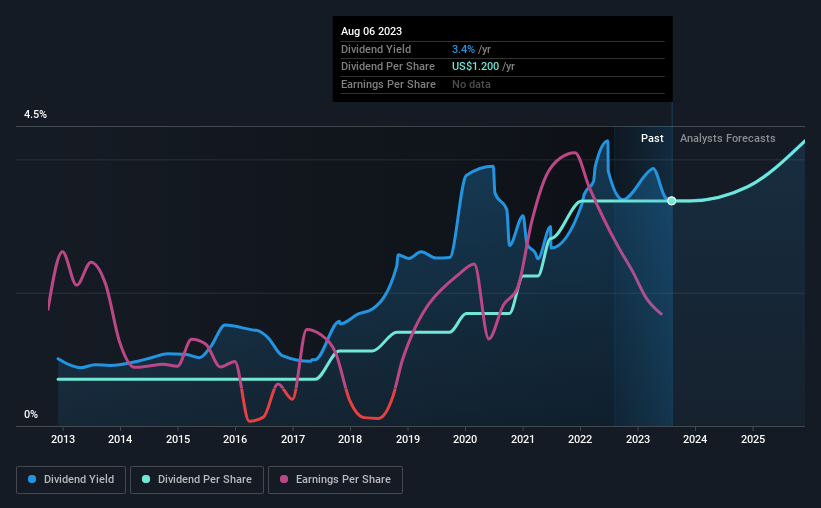Is It Smart To Buy Jefferies Financial Group Inc. (NYSE:JEF) Before It Goes Ex-Dividend?
Jefferies Financial Group Inc. (NYSE:JEF) is about to trade ex-dividend in the next 4 days. The ex-dividend date is one business day before the record date, which is the cut-off date for shareholders to be present on the company's books to be eligible for a dividend payment. The ex-dividend date is important as the process of settlement involves two full business days. So if you miss that date, you would not show up on the company's books on the record date. This means that investors who purchase Jefferies Financial Group's shares on or after the 11th of August will not receive the dividend, which will be paid on the 25th of August.
The company's next dividend payment will be US$0.30 per share, and in the last 12 months, the company paid a total of US$1.20 per share. Based on the last year's worth of payments, Jefferies Financial Group stock has a trailing yield of around 3.4% on the current share price of $35.5. We love seeing companies pay a dividend, but it's also important to be sure that laying the golden eggs isn't going to kill our golden goose! We need to see whether the dividend is covered by earnings and if it's growing.
View our latest analysis for Jefferies Financial Group
Dividends are typically paid out of company income, so if a company pays out more than it earned, its dividend is usually at a higher risk of being cut. Jefferies Financial Group paid out more than half (60%) of its earnings last year, which is a regular payout ratio for most companies.
Companies that pay out less in dividends than they earn in profits generally have more sustainable dividends. The lower the payout ratio, the more wiggle room the business has before it could be forced to cut the dividend.
Click here to see the company's payout ratio, plus analyst estimates of its future dividends.
Have Earnings And Dividends Been Growing?
Businesses with strong growth prospects usually make the best dividend payers, because it's easier to grow dividends when earnings per share are improving. Investors love dividends, so if earnings fall and the dividend is reduced, expect a stock to be sold off heavily at the same time. That's why it's comforting to see Jefferies Financial Group's earnings have been skyrocketing, up 25% per annum for the past five years.
The main way most investors will assess a company's dividend prospects is by checking the historical rate of dividend growth. Jefferies Financial Group has delivered an average of 17% per year annual increase in its dividend, based on the past 10 years of dividend payments. Both per-share earnings and dividends have both been growing rapidly in recent times, which is great to see.
The Bottom Line
Is Jefferies Financial Group an attractive dividend stock, or better left on the shelf? Earnings per share are growing at an attractive rate, and Jefferies Financial Group is paying out a bit over half its profits. Jefferies Financial Group ticks a lot of boxes for us from a dividend perspective, and we think these characteristics should mark the company as deserving of further attention.
In light of that, while Jefferies Financial Group has an appealing dividend, it's worth knowing the risks involved with this stock. Case in point: We've spotted 4 warning signs for Jefferies Financial Group you should be aware of.
If you're in the market for strong dividend payers, we recommend checking our selection of top dividend stocks.
Have feedback on this article? Concerned about the content? Get in touch with us directly. Alternatively, email editorial-team (at) simplywallst.com.
This article by Simply Wall St is general in nature. We provide commentary based on historical data and analyst forecasts only using an unbiased methodology and our articles are not intended to be financial advice. It does not constitute a recommendation to buy or sell any stock, and does not take account of your objectives, or your financial situation. We aim to bring you long-term focused analysis driven by fundamental data. Note that our analysis may not factor in the latest price-sensitive company announcements or qualitative material. Simply Wall St has no position in any stocks mentioned.

